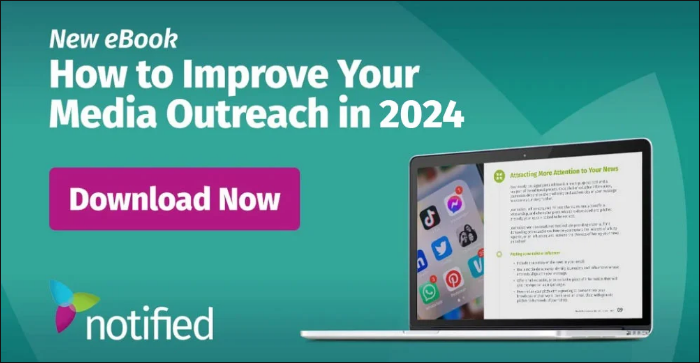Share this
How To Pitch a Press Release To Journalists: A Step-by-Step Guide
by The Notified Team on Sep 12, 2024 12:22:20 AM
So, you’ve written a press release - but that’s just the beginning. The next step is getting it noticed by journalists, and that’s where many struggle.
Featuring best practices from Michelle Garrett’s recent webinar, our blog is a step-by-step guide on how to sharpen your story pitch and get the media’s attention.
Let’s dive in!
Step 1: Research the Journalists and Media Outlets
To increase the chances of your news getting noticed, it's crucial to research who to send it to.
Here’s how to do it effectively:
Identify the Right Media Type
Determine whether your pitch is best suited for local, national, trade or broadcast media. This will help narrow down your focus.
Create a Targeted Media List
How can you do this quickly and effectively?
- Use a media database - Utilize PR tools, such as Notified’s media contacts database, that offer a user-friendly platform to build your list efficiently.
- Explore journalists’ social media profiles – Who are you following? Who should you be following? Look at journalists’ social accounts to see what they’re sharing and talking about.
- Keep your list focused - Ensure your list is specific and relevant to avoid spamming.
- Understand journalists’ work - Read the articles and stories by the journalists you’re targeting. This will give you insight into their writing style and the types of stories they cover.
Pro Tip: Don't Overlook the Smaller Publications
While targeting major outlets such as The Wall Street Journal can be effective, don’t forget the value of trade and local publications. These smaller outlets are often eager for stories and can be highly relevant to your target audience.
Step 2: Draft Your Pitch
When drafting your pitch, follow these steps:
Provide a Brief Overview
- Keep it simple: Start with a clear and concise summary of your news in the email. Get straight to the point quickly.
- Use bullet points: Present key details in bullet points to make the information easy to scan.
- Stick to facts: Use clear, factual language without unnecessary fluff.
Tell the Story
Don’t just present a product or service; explain why it matters. Describe the context and the problem it solves.
For example, instead of simply announcing a new software tool, illustrate how it addresses a significant challenge in the industry and the impact it can have.
Make It Timely
Make your pitch relevant to current events or trends. Explain why your news is important right now. Be cautious about “newsjacking”—ensure your news genuinely fits the current conversation without seeming forced.
Customize the Pitch
Customize your pitch to each journalist and their audience. You might create a base pitch and then adapt it for different verticals or publications.
Include the Full Press Release
Paste the full press release into the body of the email so journalists have all the details readily available.
Step 3: Pay Attention To the Subject Line
Don’t forget about the importance of the subject line! Use a clear and direct subject line and make sure it clearly explains what you’re pitching. Avoid vague subject lines such as “Quick question” unless you’re already in contact with the journalist.
For example, saying “Do you write about cybersecurity? I have a great source.” This could come across as annoying and might get your email blocked. Be specific and informative to catch the journalist’s attention.
Step 4: Incorporate these Essential Best Practices
Avoid the Sales Pitch
Keep your pitch factual and relevant. Avoid overly promotional language that could come across as hype. Phrases like “the greatest product ever” or “revolutionary” can turn journalists away. Instead, focus on clear, objective information.
Use Embargoes Wisely
Use embargoes carefully and only if you have a compelling story. An embargo should be used to give reporters a chance to prepare a story in advance, not just to pressure them into responding. Journalists need to agree to honor the embargo for it to be effective.
Finally, ensure there is a legitimate reason for the embargo.
Offer Exclusives
Provide exclusive content to top journalists who are highly relevant to your story. This could be a unique data point or an exclusive interview. Exclusives can increase the likelihood of coverage - but use them selectively.
Proof and Package Your Pitch
Before sending your pitch, proofread it carefully. Read it aloud, have someone else review it, use a proofreading tool and check all hyperlinks and numbers for accuracy. Always double-check the spelling of the journalist’s name.
Include everything a reporter might need:
- Visuals: Use platforms such as WeTransfer or Dropbox for large files. Avoid attachments in email.
- Interviews: Offer access to a subject matter expert or executive. Ensure availability and have a backup.
- Customer References: Verify these references before including them.
- Data: Link to relevant research or data.
- Timing: Allow enough lead time for your pitch. Try to send it in the morning and avoid Mondays, holidays or the day after long weekends. Proper timing can enhance the likelihood of your pitch being read and considered.
- Follow Up: If you don’t hear back, follow up 5-7 days after your initial pitch - but avoid excessive follow-ups.
When Should You Use a Newswire Service?
Deciding whether to use a newswire service (such as GlobeNewswire by Notified) for your press release depends on several factors - it’s something you need to evaluate based on your specific situation.
Here’s a closer look at when and why a wire service might be the right move for you:
Robust Distribution Options
Newswires serve as an important channel for getting your news in front of the right audiences. Whether your needs are local or global, a wire’s distribution network and their relationships with media partners around the world can provide expansive reach for your news.
For Publicly Traded Companies
If your company is publicly traded, you often need to use a newswire to distribute material news. This isn’t just a best practice; it’s a regulatory requirement. Using a wire service helps ensure you comply with the rules and it provides a formal channel for getting important news out to investors and the media.
Enhanced Verification and Trust
In today’s world of AI-generated content and fake news, credibility is key. Wire services like GlobeNewswire offer extra layers of verification, proving that your news is coming straight from the source. This added trust can make a big difference in how your release is received.
Learn more about CLEAR® Verified press releases.
Editorial Support
Many wire services provide editorial services to help polish your press release and catch any errors before it goes out. This extra set of eyes can help ensure your release is mistake-free and professionally presented.
By following these steps, you'll create pitches that grab journalists' attention and increase your chances of getting media coverage. A pitch that's well-researched, timely and targeted will help your press release stand out!

How to Choose the Right AI-Powered Comms Tech
![[New Report] PR and IR Collaboration: Best Practices and Challenges Revealed](https://blog.notified.com/hubfs/PRweek-featured-1.png)
[New Report] PR and IR Collaboration: Best Practices and Challenges Revealed
![[PR Webinar] How to Increase Media Pickup: What Newsrooms Want in 2025](https://blog.notified.com/hubfs/Blog-Image_1500x630_Charcoal_3.png)
[PR Webinar] How to Increase Media Pickup: What Newsrooms Want in 2025
Share this
- Public Relations (225)
- Press Releases (115)
- Press Release Distribution (94)
- GlobeNewswire (90)
- Investor Relations (88)
- PR Communications (75)
- Artificial Intelligence (72)
- Media Relations (50)
- IR Communications (41)
- Media Contacts Database (40)
- Global News Distribution (32)
- Webinar (32)
- IR Websites (30)
- Earnings Calls (22)
- Notified PR Platform (21)
- IR Webcasts (19)
- Experiences (17)
- Studio Webinar Platform (17)
- Virtual Events (17)
- Writing Tips (17)
- Case Study (16)
- PR Trends (16)
- Webcasts (16)
- PR Measurement (15)
- Generative AI (13)
- Media Monitoring (13)
- Event Technology (12)
- Investor Days (12)
- Webinar Strategy (12)
- ESG (10)
- Social Media (10)
- IR Event Platform (9)
- Newswire (9)
- United Kingdom (9)
- Virtual Event Platform (9)
- Accessibility (8)
- Earnings Day (8)
- Earnings Release (8)
- News Roundup (8)
- Regulatory Filing (8)
- Germany (6)
- Report (6)
- Social Listening (6)
- CLEAR Verified (5)
- IR Hub (5)
- Video (5)
- Webinar Engagement (5)
- Brand Storytelling (4)
- Misinformation (4)
- PR Agency (4)
- SEO (4)
- Trust (4)
- IR Trends (3)
- Journalism (3)
- AGM (2)
- Awards (2)
- Branding (2)
- CSR (2)
- Capital Narratives (2)
- DEI (2)
- Demand Generation (2)
- Insights & Analytics (2)
- ROI (2)
- Sentiment Analysis (2)
- Webhosting (2)
- Annual General Meeting (1)
- Canada (1)
- Emojis (1)
- Equiniti (1)
- Events (1)
- France (1)
- Halloween (1)
- Internal Communications (1)
- Internships (1)
- Life At Notified (1)
- Mark Cuban Foundation AI Bootcamp (1)
- Marketing (1)
- News Briefs (1)
- News Releases (1)
- PRSA ICON (1)
- Product Launch (1)
- Retail Investors (1)
- SXSW (1)
- Share of Voice (1)
- Sponsorships (1)
- Success Story (1)
- White Paper (1)
- eBook (1)
- September 2025 (4)
- August 2025 (6)
- July 2025 (9)
- June 2025 (12)
- May 2025 (9)
- April 2025 (11)
- March 2025 (11)
- February 2025 (6)
- January 2025 (12)
- December 2024 (12)
- November 2024 (12)
- October 2024 (14)
- September 2024 (15)
- August 2024 (14)
- July 2024 (14)
- June 2024 (14)
- May 2024 (12)
- April 2024 (13)
- March 2024 (13)
- February 2024 (15)
- January 2024 (11)
- December 2023 (7)
- November 2023 (13)
- October 2023 (14)
- September 2023 (7)
- August 2023 (8)
- July 2023 (7)
- June 2023 (8)
- May 2023 (8)
- April 2023 (5)
- March 2023 (5)
- February 2023 (8)
- January 2023 (9)





